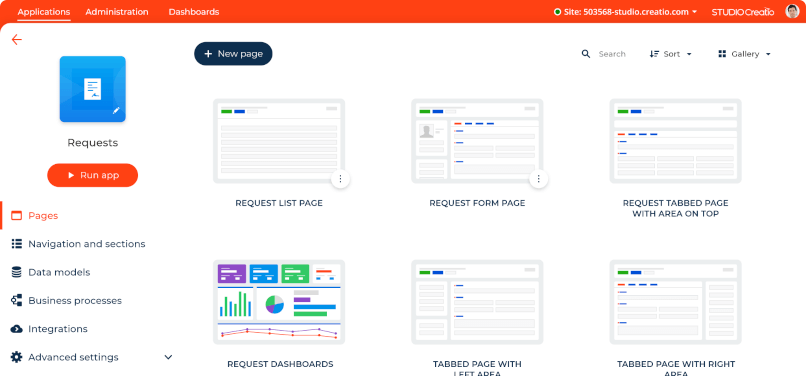anti-discrimination services
Pittsburgh’s Commission on Human Relations is redefining how public services are delivered by putting accessibility, transparency, and adaptability at the center. With Creatio’s no-code agentic automation platform, the city launched a secure, intelligent system that empowers citizens to report discrimination, enhances internal coordination, and ensures every case is managed with speed, structure, and care. The implementation process was supported by Creatio partner, Keen360 .
Learn how Pittsburgh empowers citizens and staff with Creatio’s AI-native no-code platform
Key Outcomes
Citizen-Centered Digital Access
Stronger Governance with Agility
Flexible No-Code Infrastructure
Improved Internal Collaboration
Replacing Manual Processes with Intelligent Case Management
Before adopting Creatio, the City of Pittsburgh managed discrimination complaints through a patchwork of online forms, voicemails, and email threads. These tools that made it difficult for residents to engage and even harder for staff to respond efficiently. Today, that process has been fully reimagined. Residents now have access to a secure, intuitive self-service portal where they can submit detailed complaints, track their case status, and communicate directly with the team. Behind the scenes, intake staff, investigators, and supervisors all work within a single, unified platform. Every step of the case lifecycle—from initial inquiry to resolution—is connected, traceable, and designed to move faster with less manual effort.
With Creatio, we’ve built a system that truly reflects our mission—supporting people. We’re able to adapt quickly, stay compliant, and serve the public without waiting on IT.
Security and Governance
for Citizen-Centric Services
For the City of Pittsburgh’s Commission on Human Relations, managing sensitive civil rights complaints comes with strict expectations around privacy, oversight, and accountability. What the team needed wasn’t just a digital intake tool, but a platform capable of enforcing robust data governance, driving compliance, and enabling sustainable growth. With Creatio, the Commission now operates within a secure, cloud-native environment purpose-built for the demands of the public sector. The platform offers full audit trails, role-based access controls, and centralized administration, ensuring that only authorized personnel can access case data, and that every action is traceable. System safeguards, like automatic recognition of sensitive information to help maintain a high standard of information security without creating administrative overhead. This foundation enables the team to meet its obligations to both policy and the public—confident that the platform supports their mission with transparency and control.
Government-Led Innovation
with No-Code Tools
Service delivery transformation wasn’t about assembling a large technical team, but about equipping the right people with the right tools. Powered by an agentic AI-native no-code solution and guided by implementation support, the team was able to design, launch, and now manage its own discrimination case management system—without relying on ongoing technical development. Rachel Shepherd, who oversees operations, became a driving force behind the initiative. Embracing the flexibility of no-code, she configured workflows, implemented policy changes, and continues to refine the system as the Commission’s needs evolve. When new civil rights protections were introduced in late 2024, the team updated the system the same day—ensuring the portal, internal processes, and compliance measures remained fully aligned. That level of responsiveness and operational ownership is still rare in the public sector.
I don’t have a technical background, but with Creatio, I’ve been able to build workflows, add features, and update the system as our needs change. It’s incredibly empowering to make those improvements myself

Role-Based Efficiency Built
for Government
Discrimination complaints require careful coordination across intake specialists, investigators, mediators, and supervisors—all working on sensitive, high-stakes cases. With Creatio, the Commission has introduced structure and clarity into every step of the process. Role-based workflows ensure each team member sees only the tasks and information relevant to their function, reducing distractions and enabling faster action. Cases can be handed off seamlessly, with full context preserved across touchpoints. Dashboards keep teams aligned on caseloads and deadlines, while built-in tagging and real-time notifications help staff stay responsive without relying on manual follow-ups. The result is a more focused, coordinated effort—designed to deliver better outcomes with fewer resources.
In government, structure matters—and Creatio gives us exactly that. Everyone works within clearly defined roles, and we still stay fully connected. It’s a powerful system that helps us scale services without scaling our team.
About Keen360

Keen360 specializes in creating tailored digital environments that help organizations in life sciences, health care, and the public sector excel. The company delivers industry-specific CRM solutions on the no-code Creatio platform and blended BPO services from the U.S. and Guyana, enabling full omni-channel service centers in as little as 2–4 weeks.













